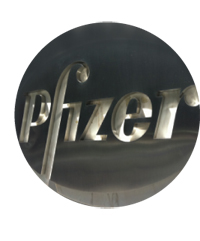5. Pfizer $18B ▲up 6.7%
Global revenue: $44.9B (2nd); up 3.6%
Top brands: Lyrica ($3.1B); Celebrex ($2.4B); Viagra ($1.3B)
Promotional spend: $2.1B (1st); 11.7% of rev.
R&D spend: $7.2B (4th); up 9.1%; 16% of rev.
Planned launches: bococizumab (CV); ertugliflozin (diab.)
Patent expirations: Premarin (2015); Zyvox (2015); Lyrica (2018); Bosulif (2019); Chantix (2020)
Pfizer’s frustrated attempt to take over AstraZeneca was the company’s most visible moment in 2014, but the company got off to a fast start in 2015 when the FDA approved its first-in-class CDK 4/6 inhibitor Ibrance for breast cancer. The approval was notable not only for the breakneck speed with which it happened but also because it handed the company a potential cornerstone medication for what could become an independent company—that is, if Pfizer decides to break itself into smaller pieces after it delivers financials for each of its three divisions in 2017. In 2014 the impact of patent expirations—for blockbusters Lipitor and Celebrex—was felt, but not enough to push the company’s sales numbers into the red. And Pfizer’s purchase of Hospira for $17 billion filled out the firm’s biosimilar pipeline, including one product that could compete with Johnson & Johnson’s Remicade autoimmune biologic. Up next, per one industry pundit: more acquisitions that could “materially change [the company’s] outlook.”
Click here to return to main story.
From the May 01, 2015 Issue of MM+M - Medical Marketing and Media







